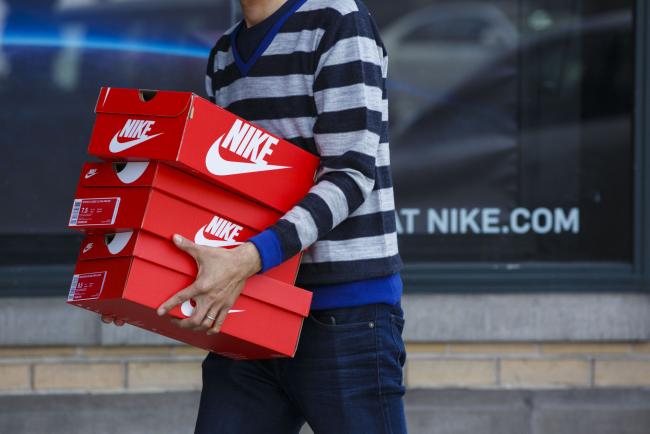(Bloomberg) -- Nike Inc (NYSE:NKE)., Adidas AG (DE:ADSGN) and other footwear companies urged President Donald Trump to reconsider his tariffs on shoes made in China, saying the policy would be “catastrophic for our consumers, our companies and the American economy as a whole.”
In all, 173 companies signed an open letter to the president, dated Monday and posted on the industry trade association’s website. “On behalf of our hundreds of millions of footwear consumers and hundreds of thousands of employees, we ask that you immediately stop this action to increase their tax burden,” the group said.
The protest came as U.S.-China trade tensions escalate and Trump threatens to impose tariffs as high as 25% on Chinese goods -- including all types of footwear, from sneakers to sandals. While the industry has shifted production away from China in recent years because of rising wages, shifting trade policies and a desire to make more goods at home in the U.S. and Europe, the Asian country remains a shoe giant.
Adidas, for example, sourced about 18% of its 409 million pairs last year from China -- putting it third behind Vietnam, which made 42% of them, and Indonesia at 28%. Most production sites are run by independent manufacturing partners.
The German company made 3% of its shoes in Europe and the Americas, where it has set up two new “speed factories” that use robots to churn out high-end shoes in a single day rather than rely on the weeks or months needed to shuttle components among different suppliers. Still, the vast majority of Adidas’s sneakers, apparel and sports equipment gets made in Asia -- and probably will for a long time to come.
Tariffs are an especially touchy subject within the footwear industry because shoe companies already pay some of the highest duties in the U.S., thanks to longstanding tariffs that in some cases surpass 30%. And this isn’t the first time the industry is feeling the impact of Trump’s trade policies. The recent pivot toward Vietnam production was in part in anticipation of the Trans-Pacific Partnership, which would have allowed duty-fee exporting to the U.S. Then Trump exited those negotiations.
The U.S. shoe industry’s trade association, the Footwear Distributors & Retailers of America, estimates that the tariffs would cost U.S. customers an additional $7 billion per year. The companies said in their letter that those costs would disproportionately affect working-class individuals. “Your proposal to add tariffs on all imports from China is asking the American consumer to foot the bill,” the letter said. “It is time to bring this trade war to an end.”
Mnuchin, Ross, Kudlow
The letter was also sent to Treasury Secretary Steve Mnuchin, Commerce Secretary Wilbur Ross and National Economic Council director Larry Kudlow. It followed last week’s list from the U.S. Trade Representative’s office of about $300 billion worth of products that could see higher import duties, including all types of footwear. Trump will discuss the tariffs with Chinese President Xi Jinping next month.
Trump has repeatedly stated that China would pay the tariffs -- something his critics say is misleading or wrong. Earlier this month, Kudlow said that “both sides” will pay.
“As an industry that faces a $3 billion duty bill every year, we can assure you that any increase in the cost of importing shoes has a direct impact on the American footwear consumer,” according to the letter.
That sentiment has been echoed around the industry. “We don’t make enough to absorb that,” said Michael Jeppesen, president of global operations for Wolverine World Wide Inc., which also signed the letter. “The only way it can is to be passed onto the consumer.”
Puma, Skechers
Still, the companies in the letter vary in their reliance on China. Nike, for example, made 26% of its apparel and 26% of its footwear in China in fiscal 2018. German company Puma SE sourced 24% of its products from China, compared with 32% from Vietnam. And while Skechers U.S.A. Inc. makes around 65% of its goods in China, not all of those products are imported to the U.S.
Under Armour Inc (NYSE:UAA)., which also signed the letter, currently gets about 18% of its products from China -- down from 46% in 2013. The company’s goal is to lower that number to just 7% by 2023.
(Updates with Adidas, Puma production, trade figures.)
